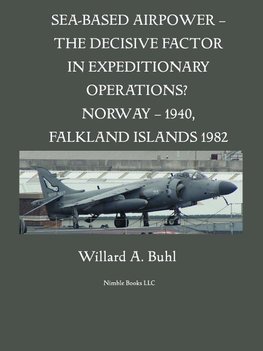
-
 Anglický jazyk
Anglický jazyk
Sea-Based Airpower - The Decisive Factor in Expeditionary Operations? (Norway, 1940; Falkland Islands, 1982)
Autor: Willard A. Buhl
Thesis: This essay examines the British use of sea-based aviation in support of two modern amphibious campaigns: the British campaign in Norway in 1940 and in the Falkland Islands War in 1982. The purpose is to determine whether or not aircraft carriers... Viac o knihe
Na objednávku, dodanie 2-4 týždne
19.53 €
bežná cena: 21.70 €
O knihe
Thesis: This essay examines the British use of sea-based aviation in support of two modern amphibious campaigns: the British campaign in Norway in 1940 and in the Falkland Islands War in 1982. The purpose is to determine whether or not aircraft carriers (sea-based aviation) were at the root of the success or failure of British efforts. Discussion: In April 1940, there were no airfields in central Norway capable of supporting modern, high performance aircraft. As the Norwegian campaign unfolded and the British faced a significant land-based air threat from the Luftwaffe, they failed to appreciate the tactical and operational potential of sea-based aviation. At the same time, British naval aircraft were technically inferior in design and capability compared to their Luftwaffe land-based counterparts in 1940. Nevertheless, despite determined attacks on British naval assets at the tactical level, at the operational level, the German command limited their campaign goals and did not exploit their advantage in the air to the extent possible. Their actions did, however, place great pressure on British sea based lines of communication in central Norway, the operational pivot of the campaign. In 1982, against the Argentines, the British faced another opponent with superior land-based aviation. Although the British fully appreciated the need for air superiority, they employed a tactical scheme not unlike what had occurred in Norway. Nevertheless, the British were able to successfully contest the airspace above the Falklands and ultimately succeeded in defeating Argentine ground forces and ejecting them from the islands. Conclusions: Expeditionary Maneuver Warfare (EMW) operations and sustainable littoral power projection will require versatile and flexible sea-based airpower. Much as the British expeditionary forces faced land-based airpower threats in Norway in 1940 and the Falkland Islands in 1982, U.S. aircraft carriers will be required to establish local air superiority over the fleet. Whereas land-based aircraft can attack fleets from great distances, current land-based fighters cannot protect the fleet from attack without extended aerial refueling. When air superiority cannot be maintained over the fleet, as evidenced in Norway and the Falklands, naval forces become prey to land-based airpower. Power projection from the sea occurs as a result of maintaining local air superiority, not in spite of it. Naval aviation exists to provide air superiority for naval fleets and sealift assets. Power projection from the sea is possible in large part because of air superiority. Until a space-based system capable of providing air superiority for ships at sea is fielded, "legacy platforms" such as aircraft carriers and their embarked air wings, despite their high cost, will remain essential naval warfare platforms. Further, however, and perhaps of greatest importance to this study, amphibious forces ashore cannot rely on aircraft carrier (sea-based) air support if a credible land-based aircraft or missile threat to supporting aircraft carriers exists.
- Vydavateľstvo: Nimble Books LLC
- Rok vydania: 2010
- Formát: Paperback
- Rozmer: 280 x 210 mm
- Jazyk: Anglický jazyk
- ISBN: 9781608880232






 Ruský jazyk
Ruský jazyk 





